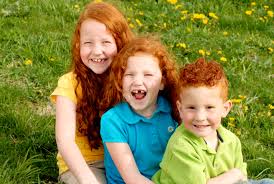Since I was two years old I have been dubbed “the oldest.” My reign of only child lasted only two short years when my younger brother came along, then later my sister and finally another brother. I took on the role of older sister with open arms along with it’s many perks and downfalls. In a sense I was the “tester” for my parents, they tested out everything on me and learned from their mistakes. Sometimes it even feels like my younger siblings get away with things I got in insane amounts of trouble for, but I guess that’s what comes with being the oldest. In a family of six there are so many different personalities and attitudes in one household. We are all different individuals growing up in one family. This makes me wonder, does birth order affect our personality?
Some researchers believe birth order is as important as gender and almost as important as genetics. Parents nurture each child a little bit differently and no child plays the same role. Huffington Post puts each child in a category ranging from “the achiever” to “the life of the party.” These roles may differ from family to family but if you look hard enough you may find each of your siblings playing one of these roles. Birth order is a powerful variable in the unfolding of your personality. There is the obvious stereotypes of a family like the oldest being independent, the youngest being babied and well the middle child just being in the middle, however, these stereotypes aren’t too far off. The center of this whole theory is the size of our family and how we are raised.
The first is highly monitored because they enter a family of adults who are proud of their every progress and frightened by every potential injury. The first born are used to insane amounts of attention from their parents causing them to be control seeking, over-responsible, reliable, well-behaved, careful and basically smaller versions of their own parents. Parent’s except their first borns to be good role models and this tends to cause a lot of pressure. Due to their birth order the oldest child is usually a perfectionist and ultimately the boss.
Some may say the middle child really gets the short end of the stick, receiving the least amount of attention. Since their personalities emerge in response to how they perceive the next-oldest sibling in the family. If the older sibling is a parent-pleaser, the middle child might rebel to get attention. The oldest child bosses them around and the baby always gets what they want so how is the middle child supposed to act? The personality trait that defines you as a middle child will be opposite of that of your eldest and youngest sibling says a study in Huffington Post. Due to their birth order the middle child is usually laid back, fair and cooperative.
Finally we come down to the baby of the family. As the youngest child, you have more freedom than the other siblings and, in a sense, are more independent. As the youngest child, you also have a lot in common with your oldest sibling, as both of you have been made to feel special and entitled. The youngest child gets away with murder because at this point the parents are too tired and have given up. The youngest child is used to learning from their older siblings so they may seem advanced. The baby of the family is usually the token “wild child.” Due to their birth order the youngest child’s if far different from his/her siblings’.
While we may not notice it, our siblings shape us and make us the person we are today. Our behavior and attitude is due to the role we play in our family. Overall I have found that birth order truly does affect our personality.
Links:
http://www.huffingtonpost.com/dr-gail-gross/how-birth-order-affects-personality_b_4494385.html
http://www.parents.com/baby/development/sibling-issues/how-birth-order-shapes-personality/
https://www.scientificamerican.com/article/ruled-by-birth-order/
Picture








